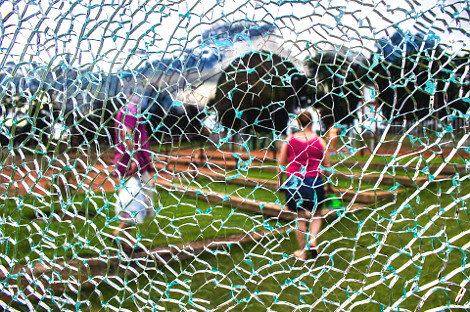Trauma
Trauma can leave you feeling stuck and trapped, getting help is important to your health.
 Trauma results when a person experiences a shocking negative event or series of events that has lasting mental, emotional and even physical affects. One can be traumatized by experiencing a threatening event or witnessing one where it leaves a person feeling terrified and helpless or powerless. Trauma is subjective and personal.
Trauma results when a person experiences a shocking negative event or series of events that has lasting mental, emotional and even physical affects. One can be traumatized by experiencing a threatening event or witnessing one where it leaves a person feeling terrified and helpless or powerless. Trauma is subjective and personal.
Trauma most always leads to a form of Post Traumatic Stress Disorder.
Defining Trauma
trauma occurs when an event or events that happen to a person are dysfunctionally stored in the brain resulting in disorder(s). Trauma alters brain function because of a severely distressing event. Trauma occurs when a person experiences an overwhelming amount of unhealthy and shocking events that overloads and over stresses one’s ability to cope and integrate the emotions that were involved with that experience.
Trauma is a larger issue than most are aware of, therefore it is frequently misunderstood or undiagnosed. Trauma can be both subjective and objective in nature.
trauma can also be explained as a unique individual experience of an event or enduring conditions (pervasive trauma), in which:
- The individual’s ability to integrate their emotional experience is overwhelmed and therefore become “stuck”.
- The individual experiences (subjectively) a threat to life, bodily integrity, or sanity. (Pearlman & Saakvitne, 1995, p. 60)1
Three Categories of Trauma
- Impersonal trauma– like a natural disaster or vehicle accident.
- Interpersonal trauma- like sexual or physical assault.
- Attachment & developmental trauma – this trauma begins in childhood that has significant effects on a person. Such things as: neglect, abandonment, betrayal or physical, , verbal, emotional, sexual or spiritual abuse.
The Negative Effects of Trauma
Understanding why some people are more traumatized than others experiencing the same event is often the result of Developmental Issues as well as what is outlined is attachment theory. Our resiliency is determined primarily by the quality of nurture we received along with the home environment that a person was raised in.
A healthy home could look like:
- A newborn child with its mother constantly without separation.
- When a child is upset that the mother/father are immediately there to intervene and give necessary comfort.
- Constant and continual healthy affectionate touch.
- Peaceful home that is secure where both parents are present.
- Emotionally, verbally, and physically supportive to the child during all of its growing phases.
- Good healthy boundaries clearly stated and enforced.
An unhealthy home could look like:
- constant conflict
- lack of emotional, verbal, and physical support
- abuses and neglects
- unclear boundaries
- divorce or separation or parental absence
- uncertainty of the child’s environment
- and much more
Attachment theory’s development began in the 1950s. The quality of the bond between an infant and it’s mother (caretaker) is the primary force in infant development, both psychologicaly and physiologically. The relationship between infant and the mother (primary caregiver) is responsible for shaping all the child’s future relationships, ability to feel safe, and to self-soothe. The quality of these 3 will determine our level of resiliency to incidences of trauma.
Trauma has further reaching effects if left untreated. Such negative effects can include physical chronic illness, relational and behavioural problems, depression, anxiety, dissociative disorders, PTSD, relationship problems, etc. But, people who have had a less secure attachment will often fare worse in comparison to those who had a healthier one.
The extent of the effects of trauma often depends on the quality of a person’s ability to self-regulate themselves emotionally as well as their emotional resilience. The better the childhood the better the core beliefs that a person holds, which in turn enables a person to find hope, strength and support.
The Answer
Through counselling, psychotherapy, natural remedies, homeopathy, spiritual support as well as other healing modalities can go a long way in helping each person recover and function normally again.
No one can hide from the effects of trauma. It effects everybody. When we get hurt physically we usually get help right away, getting help right away after a traumatic event is critical to your well being. At New Hope Counselling Centre we are committed to helping you.
Adverse Childhood Experience (ACE) Questionnaire
Take Test
1. Did a parent or another other adult in the household often insult you, humiliate, put you down or swear at you?
2. Did a parent or any other adult in the household often act in a way that caused you to be afraid that you might be physically hurt?
3. Did a parent or any other adult in the household frequently push, grab, slap, or throw something at you?
4. Did a parent or an another adult in the household ever hit you so hard that you had marks or were injured?
5. Did an adult or a younger person, at least 5 years older than you, ever touch or fondle you or have you touch their body in a sexual way?
6. Did a parent or any other adult ever try to or had oral, anal, or vaginal sex with you?
7. Did you often feel that no one in your family loved you or thought you were important or special?
8. Did you frequently feel that y our family didn’t look out for each other, feel close to each other, or support each other?
9. Did you often feel that you didn’t have enough to eat or had to wear dirty clothes, and/or had no one to protect you?
10. Did you frequently feel that y our parents were too drunk or high to take care of you or take you to the doctor if you needed it?
11. Were your parents ever separated or divorced?
12. Was your mother or stepmother frequently pushed, grabbed, slapped, or had something thrown at her?
13. Was your mother or stepmother kicked, bitten, hit with a fist, or hit with something hard at any time?
14. Was your mother or stepmother ever repeatedly hit for a few minutes or threatened with a gun or knife?
15. Did you live with anyone who was a drinker or alcoholic or who used street drugs?
16. Was a household member ever depressed or mentally ill or attempt suicide?
17. Did a household member ever go to prison?
Now that you have completed this self-test add up all of your “Yes” or “True” answers, this is your ACE Score. If your score is greater than ‘3’ you have significant childhood trauma issues that need to be professional addressed. Private and confidential help is available to you at New Hope Counselling Centre.
References
Some of the information included in this page has been adapted from:
Diagnostic and Statistical Manual of Mental Disorders, Fourth Edition. Washington, DC, American Psychiatric Association, 1994. https://www.adaa.org/screening-posttraumatic-stress-disorder-ptsd
https://en.wikipedia.org/wiki/ _trauma
Pearlman, Laurie Anne, and Karen W. Saakvitne. Trauma and the Therapist. New York: Norton, 1995.
More Resorces To Better Your Life!





